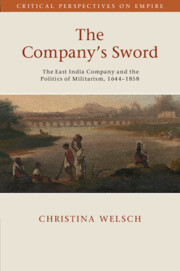Book contents
- The Company’s Sword
- Critical Perspectives on Empire
- The Company’s Sword
- Copyright page
- Contents
- Figures
- Maps
- Acknowledgments
- A Note on Spelling and Place Names
- Maps
- Introduction
- 1 Forging the Sword
- 2 The Sepoy’s Oath
- 3 Mercenaries, Diplomats, and Deserters
- 4 The Other Revolution of 1776
- 5 The Empire Preserved
- 6 Stratocracy
- 7 Breaking the Officers’ Sword
- Conclusion
- Bibliography
- Index
4 - The Other Revolution of 1776
Published online by Cambridge University Press: 08 September 2022
- The Company’s Sword
- Critical Perspectives on Empire
- The Company’s Sword
- Copyright page
- Contents
- Figures
- Maps
- Acknowledgments
- A Note on Spelling and Place Names
- Maps
- Introduction
- 1 Forging the Sword
- 2 The Sepoy’s Oath
- 3 Mercenaries, Diplomats, and Deserters
- 4 The Other Revolution of 1776
- 5 The Empire Preserved
- 6 Stratocracy
- 7 Breaking the Officers’ Sword
- Conclusion
- Bibliography
- Index
Summary
In June 1776, a group of Company officials conspired to overthrow the governor of the Madras Presidency, George Pigot. Both sides borrowed rhetoric from the more famous revolution then underway in America to frame the conflict as an issue of liberty and tyranny, but many in Britain saw the coup as little more than a cash grab in a settlement that had become synonymous with greed. This chapter revisits Pigot’s overthrow to show how this story of avarice was shaped by political conflict between two Indian rulers, Muhammad Ali Khan Wallajah of Arcot and Tuljaji Bhonsle of Thanjavur. Both rulers had shored up their positions by offering patronage to various Company officials: Pigot had ties to Thanjavur, while his opponents had been courted by Arcot. Their competing interests fueled fierce debates in Madras about how the Company should intervene in Indian affairs – and who should direct that intervention. The Company’s European officers used the crisis to claim new authority over their civilian counterparts and led the coup against Pigot. In Britain, officials condemned the coup, but in Madras, it established a powerful precedent used by politically ambitious officers for decades to come.
Keywords
- Type
- Chapter
- Information
- The Company's SwordThe East India Company and the Politics of Militarism, 1644–1858, pp. 113 - 141Publisher: Cambridge University PressPrint publication year: 2022

